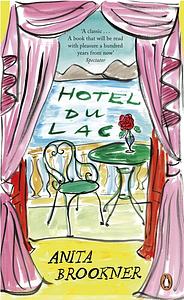Take a photo of a barcode or cover
It's out of season at Hotel du Lac: September mists roll up from the lake, and snow falls on the mountain. The hotel is half-empty, and the guests are mostly lonely women who have nowhere else to be. The opening of this novel is very soothing: the descriptions of regular, excellent meals, the slow walks by the lake, and the atmosphere of quiet and loneliness combines to make the hotel a place of escape. But Edith Hope has not merely come to Hotel du Lac to work on her next novel, she's also exiled following humiliating social disgrace, the nature of which the reader does not discover until late in the novel. At Hotel du Lac her own loneliness becomes piercingly obvious to her: she realises, among the other lonely women, who are also bereaved, estranged from husbands, or stuck in adolescence, I have not lived enough and it is too late to redeem myself . There is a moving ambivalence to this novel, in which Edith wishes to find solace with men, but none of them are satisfactory yet she also cannot embrace her independence but or be comfortable with it.
Unfortunately this is also a book that does not examine the idea that women find their ultimate companionship in men, that women alone together only create an atmosphere of indulgence and petty hatred, and that a woman's place is ultimately with a man. As Edith opines: Some women close ranks because they hate men and fear them. [...] What I'm trying to say is that I dread such women's attempts to recruit me, to make me their accomplice. I'm not talking about the feminists. I can understand their position, although I'm not all that sympathetic to it. I'm talking about the ultra-feminine. I'm talking about the complacent consumers of men with their complicated but unwritten rules of what is due to them. Treats. Indulgences. Privileges. The right to make illogical fusses. The cult of themselves. Such women strike me as dishonourable. And terrifying. I think perhaps men are an easier target. I think perhaps the feminists should take a fresh look at the situation. These views are left unchallenged by the text; in fact, this is shown as a moment of insight.
The novel is saved by an ambivalent ending, and by characters that are viewed with complexity if not kindness. Anita Brookner managers to evoke a lot of emotion in a short space, and her writing has a certain subtlety. I did not enjoy this book, and I wouldn't recommend it, but it is memorable, and it is a literary achievement.
Unfortunately this is also a book that does not examine the idea that women find their ultimate companionship in men, that women alone together only create an atmosphere of indulgence and petty hatred, and that a woman's place is ultimately with a man. As Edith opines: Some women close ranks because they hate men and fear them. [...] What I'm trying to say is that I dread such women's attempts to recruit me, to make me their accomplice. I'm not talking about the feminists. I can understand their position, although I'm not all that sympathetic to it. I'm talking about the ultra-feminine. I'm talking about the complacent consumers of men with their complicated but unwritten rules of what is due to them. Treats. Indulgences. Privileges. The right to make illogical fusses. The cult of themselves. Such women strike me as dishonourable. And terrifying. I think perhaps men are an easier target. I think perhaps the feminists should take a fresh look at the situation. These views are left unchallenged by the text; in fact, this is shown as a moment of insight.
The novel is saved by an ambivalent ending, and by characters that are viewed with complexity if not kindness. Anita Brookner managers to evoke a lot of emotion in a short space, and her writing has a certain subtlety. I did not enjoy this book, and I wouldn't recommend it, but it is memorable, and it is a literary achievement.
This has been in my queue for a long time; I think I found it on a list about romances for "mature" women, back when I was binge reading regency romances. This is a beautiful and forthright story about maturing into authenticity, and feeling good in one's skin, instead of trying to conform to being what one is expected to be. Many quotable insights as well as some laugh-out loud moments. I really enjoyed this!
The book summary posits that the book asks the question, "Why love?", but I think the more appropriate question is, "What is a woman?" I haven't quite figured out Edith Hope's answer, but am satisfied with her final reaction to Philip Neville's mansplanation.
On a side note: although the book was published in 1984, the story seems like it takes place anytime between the late 19th-century and mid 20th-century - until 39-year old Edith is compared to Princess Anne, who was born in 1950.
On a side note: although the book was published in 1984, the story seems like it takes place anytime between the late 19th-century and mid 20th-century - until 39-year old Edith is compared to Princess Anne, who was born in 1950.
Well this was not was I was expecting. I think I thought it might be a romance, but it was actually a pretty melancholic meander into The Lives Of Rich Women With Far Too Little To Worry About. It was so very dated. But that was probably intended as some sort of metaphor.
It was pretty dull, to be frank, and not really very endearing. But it was written beautifully.
It was pretty dull, to be frank, and not really very endearing. But it was written beautifully.
reflective
sad
Graphic: Infidelity, Misogyny, Sexism
Gorgeous, marvelous book! I hated the first few pages, but very quickly I was drawn in to the luscious writing, the nuances of feeling and expression, the rare words. It’s thickly written, not easily discerned, but I read late into the night to reach the ending — which was surprising, and then, just right.
reflective
medium-paced
Plot or Character Driven:
Character
Strong character development:
Yes
Diverse cast of characters:
No
Flaws of characters a main focus:
Yes
This is definitely not a book for everyone, but I loved it. It has a modernist style, very Persephone themes, and achingly lush writing, the sort of book where nothing really happens but the protagonist is changed forever. There is a certain timelessness here as well — were it not for the mentions of television and air travel, it feels as though this could have taken place at almost any point throughout the 20th century.
At first, I was concerned that Brookner's long, rich sentences and indulgent descriptions would prove too much even for me, but once I got more into the story, that proved not to be the case. I will say that there is definitely a level of pretension here that would likely be off-putting for some people. I also would have liked to know more about Edith's career as a romance writer. There was definitely room for a deeper, cynical exploration of its paradoxical implications for her personal circumstances.
I am now definitely keen to read more of Brookner's work, especially where it incorporates her background as an art historian. Beautiful writing and a micro-exploration of human nature are always literary assets in my book.
At first, I was concerned that Brookner's long, rich sentences and indulgent descriptions would prove too much even for me, but once I got more into the story, that proved not to be the case. I will say that there is definitely a level of pretension here that would likely be off-putting for some people. I also would have liked to know more about Edith's career as a romance writer. There was definitely room for a deeper, cynical exploration of its paradoxical implications for her personal circumstances.
I am now definitely keen to read more of Brookner's work, especially where it incorporates her background as an art historian. Beautiful writing and a micro-exploration of human nature are always literary assets in my book.
reflective
medium-paced
Plot or Character Driven:
Character





